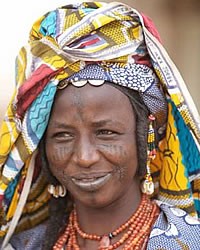Fulani, Western in Niger

Photo Source:
Copyrighted © 2026
GoWestAfrica All rights reserved. Used with permission |
Send Joshua Project a map of this people group.
|
| People Name: | Fulani, Western |
| Country: | Niger |
| 10/40 Window: | Yes |
| Population: | 674,000 |
| World Population: | 2,150,500 |
| Primary Language: | Fulfulde, Western Niger |
| Primary Religion: | Islam |
| Christian Adherents: | 0.02 % |
| Evangelicals: | 0.01 % |
| Scripture: | New Testament |
| Ministry Resources: | Yes |
| Jesus Film: | Yes |
| Audio Recordings: | Yes |
| People Cluster: | Fulani / Fulbe |
| Affinity Bloc: | Sub-Saharan Peoples |
| Progress Level: |
|
Introduction / History
The Fulani in Western Niger are sometimes called "Gorgaabe," meaning "People of the west." They are descendants of clans that originated either in Fuuta Toro (northern Senegal) or in Macina (Mali). They made their way by different routes across West Africa and in different time periods to Niger. The first arrivals settled in the Niger River Valley, and then gradually the arriving groups spread to a network of dry riverbeds east of the Niger River called "Dallols": the Dallol Bosso, Dallol Foga, and Dallol Maouri.
At one time these families also belonged to the larger social hierarchy of the Tukolor Kingdom or of the Malian Empire, thus there are vestiges of various castes among these groups. Some are nobles, some religious teachers, some come from the class of tradesmen and diplomats, and some are herders, hunters or blacksmiths. Some also are descendants of the Muslim warriors who established the Sokoto Empire in the early 1800s.
Now the majority of them have settled in and around towns and cities in the Departments of Niamey and Dosso. Some have become farmers, although owning cattle is still a key part of their ethnic identity. The religion of the majority of the Fulani, Islam, is also a key part of their ethnic identity. It has been said that it is not possible to be Christian and Fulani at the same time.
Fulfulde, the language spoken by the Fulani, is spoken across Africa, from Senegal to Djibouti. The vocabulary and pronunciation of the language changes so much that it becomes incomprehensible when used between speakers of different regions. Western Niger Fulfulde has been a dialect with strategic importance for Bible translation.
What Are Their Lives Like?
Fulani culture places a high value on self-control and on a certain stoicism which does not allow any demonstration of weakness. This emphasis on modesty is seen in the tradition that no Fulani should ever be seen eating. When one Fulani wants to express friendship towards another, he will lend him a cow. The person receiving the cow takes care of it until it has a calf, and then he returns it to the owner. Taking care of the borrowed cow is so important that they take better care of this one than their own cattle.
Long-horned cattle are not only prized possessions but are, in fact, a means of survival for the Western Fulani of Niger. Their lives revolve around and are dedicated to their herds. The more cattle a man owns, the more respect he is given. An advanced knowledge of cattle herding is an education desired by all. Their staple food, milk, is obtained from their herds.
A Western Fulani family consists of a father, his sons, their wives and children, and the herds. With each new season they journey-always for the needs of the herds. A man's responsibilities lie in herding, political affairs, treating illness, and planning the next migration. A woman milks the cows and prepares butter and cheese. She is allowed to sell any excess dairy products at the market. She also makes clothing and blankets, gathers firewood, and prepares the daily meals, which usually consist of a millet-based porridge.
The Western younger Fulani boys help their older brothers with herding. When they reach the age of twelve, they enter sukaabe, or "young adulthood." At this time, they learn the rules of respect, courtesy, and justice, as the Western Fulani are an independent people with a strong moral code.
What Are Their Beliefs?
They are overwhelmingly Muslim; however, their traditional pre-Islamic rituals and beliefs are still followed today. Only vaguely are they linked with Islam.
Animal sacrifices play an important role in the ritual celebrations of fatherhood, deaths, marriages, and other formal ceremonial occasions, such as the worso. The worso is an annual celebration held within family groups just before the rainy season. Among other things, firstborn sons are honored, and marriages are acknowledged. The men arrive on camels and are dressed in their finest attire. Women arrive on donkeys and show off their wedding ceremonial gifts and their most prized belongings.
What Are Their Needs?
Periodically they face famine. They need rain for their cattle and crops!
Prayer Points
Pray for adequate rain to come to their homeland as a testimony of God's power and provision.
Ask the Lord of the harvest to send African Christians to demonstrate the love of Christ.
Ask the Holy Spirit to grant wisdom and favor to mission agencies who want to work among them.
Ask God to raise up prayer warriors who will faithfully intercede for them.
Pray that strong local churches will be raised up among the Western Fulani.